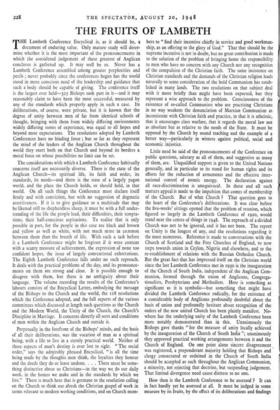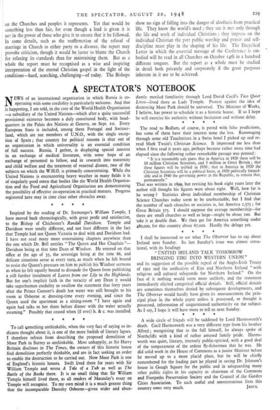THE FRUITS OF LAMBETH
THE Lambeth Conference Encyclical is, as it should be, a document of enduring value. Only mature study will deter- mine whether it is the most important of the pronouncements in which the considered judgement of these greatest of Anglican conclaves is gathered up. It may well be so. Never has a Lambeth Conference assembled among greater perplexities and perils ; never probably since the conferences began has the World stood in more conscious need of the leadership and guidance that such a body should be capable of giving. The conference itself is the largest ever held-325 Bishops took part in it—and it may reasonably claim to have been the most successful, measured by any of the standards which properly apply in such a case. Its deliberations, of course, were private, but it is known that the degree of unity between men of far from identical schools of thought, bringing with them from widely• differing environments widely differing stores of experience, was equal to all hopes and beyond most expectations. The resolutions adopted by Lambeth Conferences have no binding force ; but so far as they represent the mind of the leaders of the Anglican Church throughout the world they exert both on that Church and beyond its borders a moral force on whose possibilities no limit can be set.
The considerations with which a Lambeth Conference habitually concerns itself are necessarily diverse. There is the state of the Anglican Church—its spiritual life, its faith and order, its standards, its needs—and there is the state of a largely pagan world, and the place the Church holds, or should hold, in that world. On all such things the Conference must declare itself firmly and with conviction, but with no suggestion of dogmatic assertiveness. If it is to give guidance to a multitude that may be likened still to shepherdless sheep, it must be with a full under- standing of the life the people lead, their difficulties, their tempta- tions, their half-conscious aspirations. To realise that is only possible in part, for the people in this case are black and brown and yellow as well as white, with not much more in common between them than the breath of life. With such a task before it a Lambeth Conference might be forgiven if it were content with a scanty measure of achievement, the expression of none too confident hopes, the issue of largely conventional exhortations. The Eighth Lambeth Conference falls under no such reproach. It deals with the practical problems of the day, and its pronounce- ments on them are strong and clear. It is possible enough to disagree with them, but there is no ambiguity about their language. The volume recording the results of the Conference's labours consists of the Encyclical Letter, embodying the message of the Bishops to the Church and the world, the 118 resolutions which the Conference adopted, and the full reports of the various committees which discussed at length such questions as the Church and the Modern World, the Unity of the Church, the Church's Discipline in Marriage. It concerns directly all sorts and conditions of men within the Anglican Church and outside it.
Perpetually in the forefront of the Bishops' minds, and the basis of all their deliberations, was the vocation of man as a spiritual being, with a life to live in a sternly practical world. Neither of those aspects of man's destiny is ever lost to sight. "The social order," says the admirably phrased Encyclical, "is all the time being made by the thoughts men think, the loyalties they honour and the deeds they do or leave undone. . . . There must be some- thing distinctive about us Christians—in the way we do our daily work, in the homes we make and in the standards by which we live." There is much here that is germane to the resolution calling on the Church to think out afresh the Christian gospel of work in terms relevant to modern working conditions, and on Church mem- bers to "find their incentive chiefly in service and good workman- ship, as an offering to the glory of God." That that should be the supreme incentive is not in doubt, but no great contribution is made to the solution of the problem of bringing home the responsibility to men who have no concern with any Church nor any recognition of the compulsion of the Christian faith. The same insistence on Christian standards and the demands of the Christian religion leads naturally to some consideration of the hold Communism has estab- lished in many lands. The two resolutions on that subject deal with it more briefly than might have been expected, but they represent a wise approach to the problem. Consciousness of the existence of so-called Communists who are practising Christians in no way weakens the denunciation of Marxian Communism as inconsistent with Christian faith and practice, in that it is atheistic, that it encourages class warfare, that it regards the moral law not as absolute but as relative to the needs of the State. It must be opposed by the Church by sound teaching and the example of a better way—particularly in witness against political, social and economic injustice.
Little need be said of the pronouncements of the Conference on public questions, salutary as all of them, and suggestive as many of them, are. Unqualified support is given to the United Nations generally, and in particular to its stand for human rights and its efforts for the reduction of armaments and the effective inter- national control of atomic energy. The declaration against all race-discrimination is unequivocal. In these and all such matters appeal is made to the impulsion that comes of membership of the Church. But of what Church ? That question goes to the heart of the Conference's deliberations. It was clear before the five-weeks' sittings opened that the problem of reunion, which figured so largely in the Lambeth Conference of 1920, would stand near the centre of things in 1948. The reproach of a divided Church was not to be ignored, and it has not been. The report on Unity is the longest of any, and the resolutions regarding it the most numerous. Reference is made to conversations with the Church of Scotland and the Free Churches of England, to new steps towards union in Ceylon, Nigeria and elsewhere, and to the re-establishment of relations with the Russian Orthodox Church. But the great fact that has impressed itself on the Christian world since the last Lambeth Conference met in 1930 is the inauguration of the Church of South India, independent of the Anglican Com- munion, formed through the union of Anglicans, Congrega- tionalists, Presbyterians and Methodists. Here is something as significant as it is symbolic—but something that might have divided the Lambeth Conference radically, for the existence• of a considerable body of Anglicans profoundly doubtful about the basis of union and profoundly hesitant about recognition of the orders of the new united Church has been plainly manifest. No- where has the underlying unity of the Lambeth Conference been more notably demonstrated than in this. Unanimously the Bishops gave thanks "for the measure of unity locally achieved by the inauguration of the Church of South India "; unanimously they approved practical working arrangements between it and the Church of England. On one point alone sincere disagreement was registered, a preponderant majority holding that Bishops and clergy consecrated or ordained in the Church of South India should be accepfed as such throughout the Anglican Communion, a minority, not rejecting that doctrine, but suspending judgement. That limited divergence need cause distress to no one.
How then is the Lambeth Conference to be assessed ? It can in fact hardly yet be assessed at all. It must be judged in some measure by its fruits, by the effect of its deliberations and findings ' on the Churches and peoples it represents. Yet that would be something less than fair, for even though a lead is given it is i no in the power of those who give it to ensure that it be followed. In some details, such as the reaffirmation of the refusal of marriage in Church to either party to a divorce, the report may Iprovoke criticism, though it would be juster to blame the Church for relaxing its standards than for maintaining them. But as 3 whole the report must be recognised as a wise and inspiring interpretation of the eternal Christian gospel in the light of the conditions—hard, searching, challenging—of today. The Bishops show no sign of falling into the danger of aloofneis from practical life. They know the world's need ; they see it met only through the life and work of individual Christians ; they impress on the individual Christian the part public worship and prayer and self- discipline must play in the shaping of his life. The Encyclical Letter in which the essential message of the Conference is em- bodied will be read in all Churches on October 14th in a hundred different tongues. But the report as a whole must be studied in detail both privately and corporately if the great purposes inherent in it are to be achieved.



































 Previous page
Previous page